Louisville Forward, the city’s economic-development agency, recently released a report on the status of west Louisville. One bulleted line reads: “Ninth Street is being re-imagined as a welcoming gateway to west Louisville.” While the beautification of Ninth Street itself could result in improved walkways and public green spaces, it’s the success of what’s happening beyond Ninth Street that can truly erase the so-called East End-West End divide.
Some of the major west Louisville projects underway: a $28-million YMCA; $35 million for Waterfront Park Phase IV; a nearly $30-million grant from the U.S. Department of Housing and Urban Development for mixed-income housing in place of the Beecher Terrace public-housing complex, part of nearly $187 million in public and private investment for the surrounding Russell neighborhood; the Louisville Urban League’s $35-million multi-sport facility at 30th Street and Muhammad Ali Boulevard.
After decades of disinvestment, letdown and struggle (with never-wavering pride and hope), the changes are garnering cheers, but also fear of gentrification. The current all-hands-on-deck holistic approach has a goal of tackling areas such as health, education, personal finance, infrastructure improvements, youth support and homeownership. It’s an attempt to make this time different. But who will benefit financially, socially and otherwise after the fresh paint dries?
The recently launched Russell: A Place of Promise and other groups — including the Louisville Urban League, Black Lives Matter, Vision Russell, churches and more — are keeping residents informed of and engaged in west Louisville’s swift changes. How do homeowners hold on to their homes? How does a neighborhood ensure that the expected shops, restaurants and other amenities will fulfill the wants and needs of the community? The uncertainty has caught the attention of journalist Soledad O’Brien, who on her show Matter of Fact has begun tracking the city’s progress in its west Louisville endeavors.
For the following interviews, which have been edited for length and clarity, we enlisted the help of Marshae and Walter Smith. They created their blog, West of Ninth, to share the voices and stories of west Louisville’s nine neighborhoods, and for this assignment they asked folks: What has life been like west of Ninth? What is it like right now? And what could it be like in the future?
— Mary Chellis Nelson
All photos courtesy of West of Ninth.
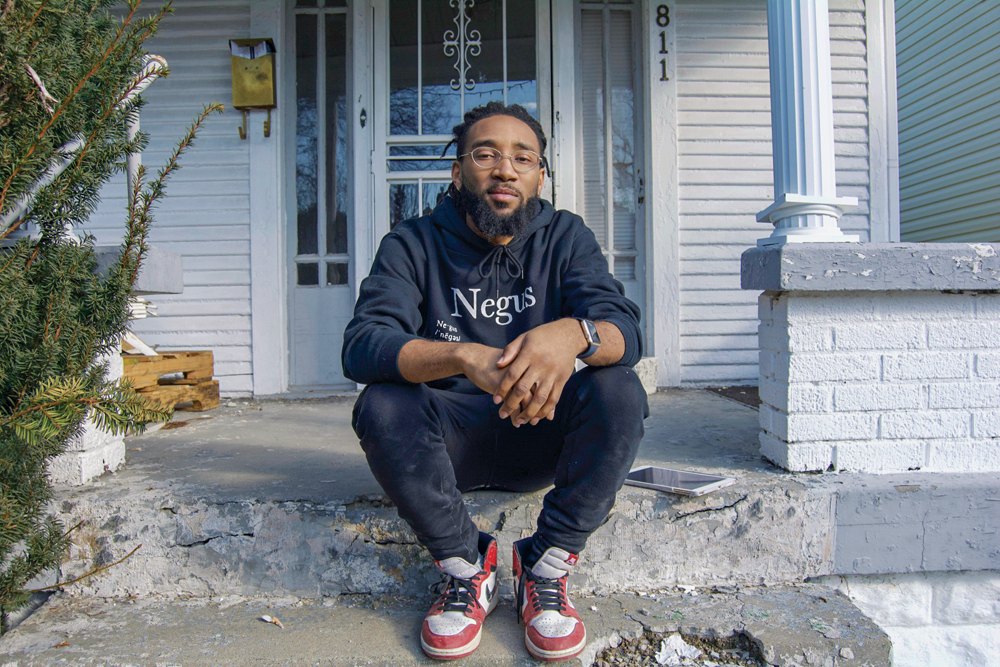
Kevin, Chickasaw
owner of Jackson Recycle Homes
“What we plan to do with this (house) is to rehab it and rent it back to two people who want to stay in the community, while raising the property value (for) people who live here. We’re looking to take old gems like this, which have the bones, and make them new and modern and basically gentrify the neighborhood. What it really means to gentrify is to bring it up to middle-class standards. The bad connotation from it comes from big companies coming and building, buying blocks of land, tearing (buildings) down and putting up brand-new superstores. These stores sell food that don’t serve the people in the community. Our people really can’t afford to shop at Whole Foods.
“A lot of new projects are going on. They’re mainly coming from downtown all the way through Muhammad Ali Boulevard, all the way down to Portland, straight onto the Northwestern and Southwestern Parkway. I think those are the areas that will hit first, and then it’s just going to keep expanding, because a lot of people from outside the community are realizing that these houses are huge and that you’re not paying much for it.
“I just want to try to help our people keep their assets if they can. It’s very important for us to take ownership. People are starting to realize that more so now than ever, and people are starting to try to keep what they have in their family and just make smarter moves. I don’t think we had all the education and resources that other people who have had lots of money in their family for a long time (have had). It’s like you finally have the opportunity to get a house, and you get a house and it gets overwhelming. Some don’t have enough to pay the bills and they lose it. The Urban League (has resources) that help you if you’re a month behind or starting to get behind.
“Someone could be from the West End and will get a degree and get a good job and will move to St. Matthews. They’ll be paying $2,000 a month in rent for a two-bedroom, when you can easily buy a home in the West End and your mortgage will probably be $600 or $700 a month. And that’s paying into something you own, rather than someone else’s pockets.
“It must start with the people, and I’ve really been trying to get people to move this way.”
_____________________________________
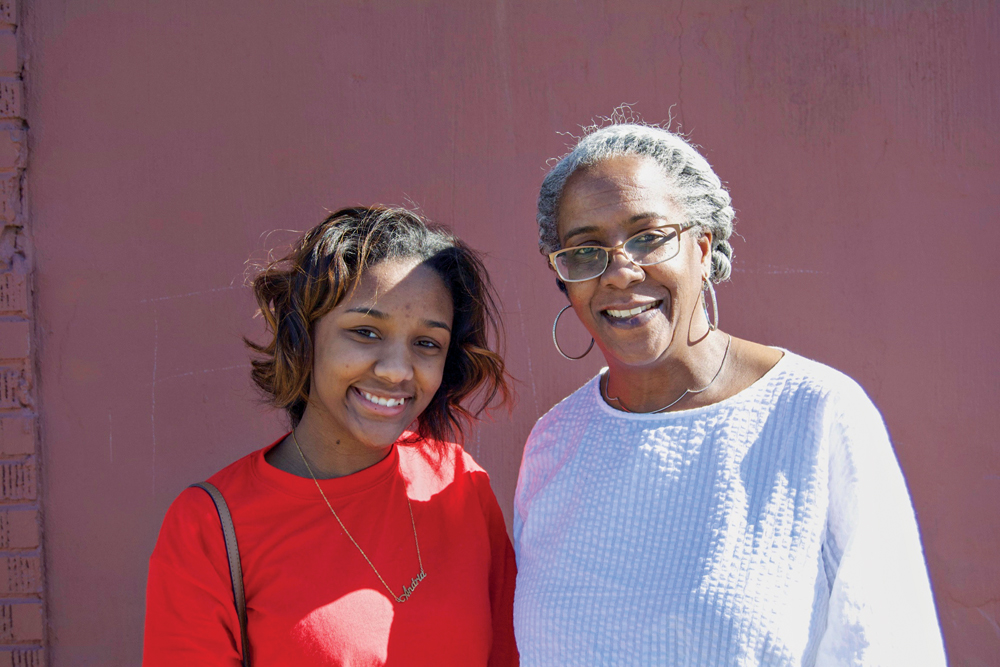
Felicia, Russell
(pictured with Andria, left)
“I grew up in the Shawnee neighborhood, off 35th and Market. Now I live on 16th and Algonquin. My early memories consist of Jewel Park (now E. Leland Taylor Park), Fontaine Ferry, Shawnee Park, free lunches at the park. We used to have a big thing in Shawnee Park during the summertime. There was so much. Now, everything is different. The YMCA (that closed in the ’80s) is not on Market Street no more. There used to be basketball games and cheerleading down there. I remember the church buses used to come down to the neighborhood and pick the kids up. Just the other day, I was telling (Andria, pictured) and her friend that I remembered when MSD would come through and clean the sewers. They would stop at every sewer and clean the trash out. They don’t do that no more. They talk about beautification and I’m like, ‘OK, well, fix our streets. Fix our sidewalks.’ I remember the article from the Urban League encouraging black homeowners not to sell their homes. I tell a lot of people to not sell their homes, but a lot of them live in high-crime areas and want to get out.
“I tell my kids, ‘When you hear bullets, don’t run. Hit the ground and crawl on your hands and knees, like you’re in the army. So what if you get scarred up — you’ll still be here.’ You gotta have your faith in God and know that he’s got your back when in these streets.
“You got the YMCA coming and that’s promoting better health for us. They’re providing these programs. We really need the programs because we got a lot of mental illness out here in our community and we need someone to get out here and help these people.
“We want to get out and venture, but we want to have the best in our area, too. Like I said, I love the West End; the West End is beautiful. I just wish our people would do better.”
_____________________________________
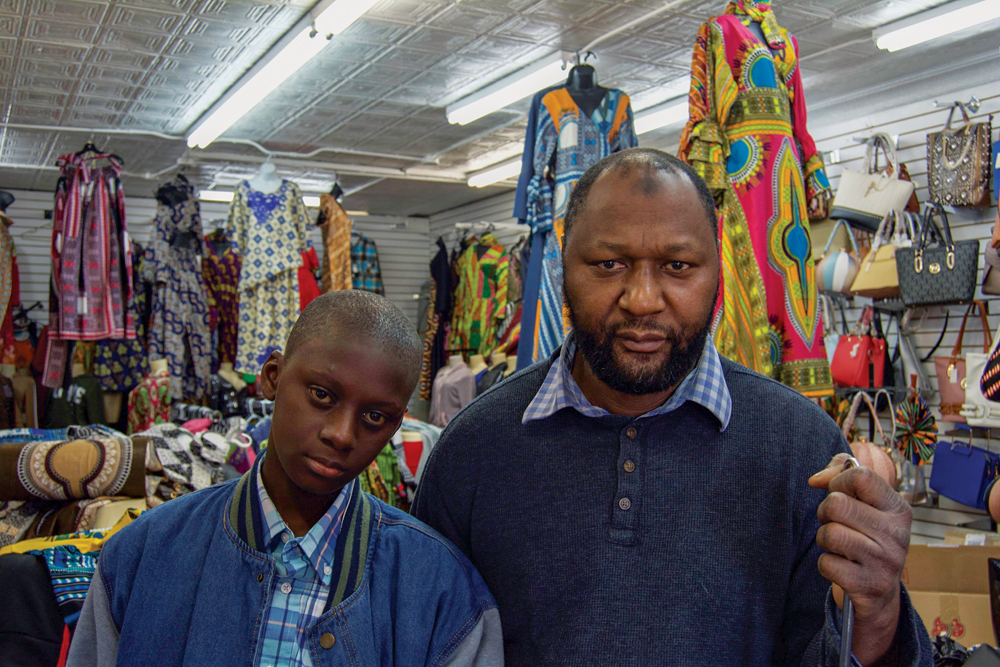
Babinta, Russell
(pictured with Mohamed, left), owner of Broadway Fashion & Decor
“I’ve been here since 1998. It’s been 21 years. When I came here, I was the only business here. It was just me, Chevron and Kroger. I remember when I first opened my business, the police used to be worried about me. At that time, there was a lot of crime over here. People were scared to come to the West End. Now, people are coming back to live here. People are wanting to spend money and support black businesses.
“They were supposed to put Walmart over here and people fought. Walmart would have been good; it could have brought a lot of people from a 10-mile radius.
“I hope they hire people from the West End. I hope it’s not going to be a bunch of people from outside that will just come to work and go home. We wouldn’t benefit from that. The YMCA will be good for the neighborhood. The director said that he’s going to make sure (kids know) how to swim, so that’s good. That’ll be a positive thing for the neighborhood.”
_____________________________________
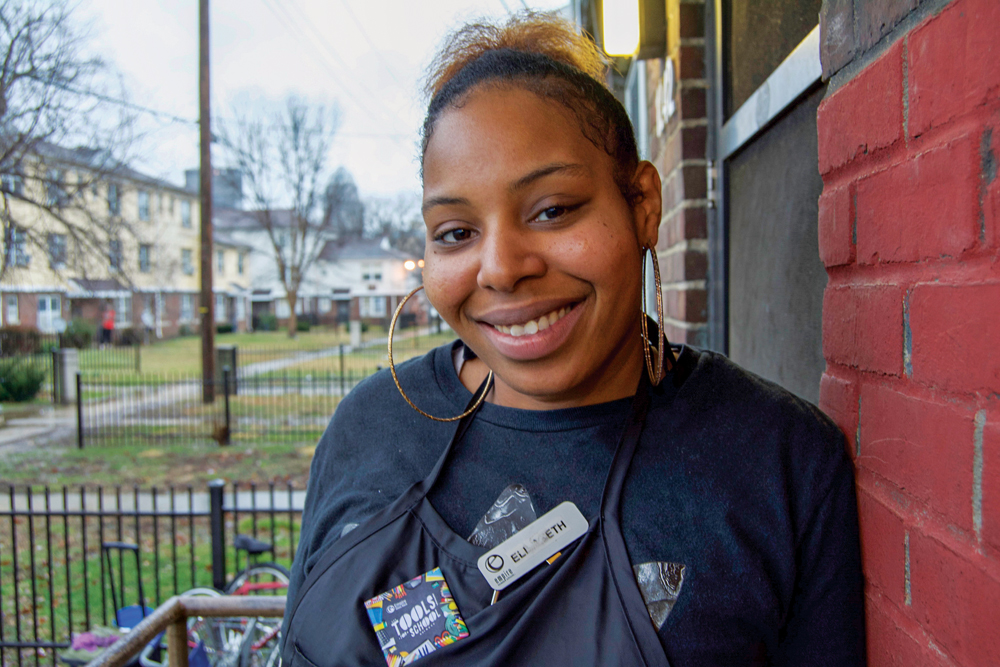
Elizabeth, Russell
“I ended up being in the streets for about three or four years, and then in 2012 I got to Beecher (Terrace, the public-housing complex in Russell). My experience has been up and down. I almost lost my place about four or five times. Utilities have been cut off and I haven’t had food sometimes. I’ve been stressed and depressed. I had to get over those humps. I lost my kids in 2008, and I’ve been trying to get everything in order to get them back.
“I think the new development in Beecher Terrace is going to be OK. They just told us that we can get homeownership through the Urban League, so that’s what I plan on doing. I plan on holding down my place. Not only that, I want to open my own salon and come back and give back to my community. I wanna give back to the same community who helped and supported me by telling me they weren’t going to let me fall.”
_____________________________________
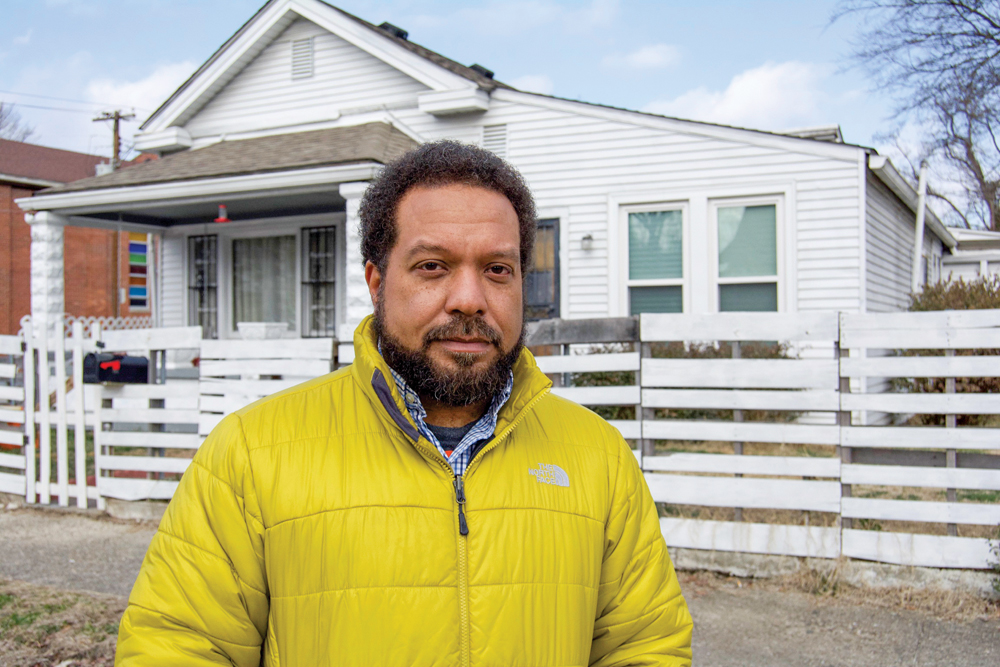
Haven, Russell
“I remember my shoelaces getting caught on the escalator at Sears, which was on Ninth and Broadway. It wasn’t until later in life, when I was talking to my grandfather and some of his friends, that I would understand some of the things that he would do. He used to always order his shoes from books. I always wondered about that. He would never really go to shoe stores and pick them out. He would order them from these little catalogs that he used to get. I thought it was because he needed special barbering shoes. Come to find out, when my dad was younger, at that time, department stores on Fourth Street wouldn’t let black folks try on shoes or clothes. That made my grandfather furious. He decided not to patronize those places and would order his stuff from catalogs.
“I call this neighborhood the bricks. I like the urban feel. I always loved the urban feel. I like having the ability just to walk to places. I like the density and the older homes. When I go to places like Chicago and Baltimore, I like that urban feeling. One good thing about these older homes is the way they are made. They are infinitely repairable. It just takes the elbow grease and the resources. You can get some of these houses for $5,000 to $10,000 and take out a mortgage for $150,000 and you’ll have just as nice of a home as in Old Louisville and you’ll do more with it. You’ll have your granite countertops and your stainless-steel appliances. You would have a home that if you could pick it up and move it NuLu, you would have a $600,000 crib. The biggest thing is getting people who care about the neighborhood to move back into the neighborhood and take that leap of faith. Now, a lot of people don’t want to because there’s not a lot in Russell. But you can’t get the services without the people. Specifically, you can’t get the services without the income. It’s like the chicken and the egg. What comes first?
“You know, Louisville has a grant right now and they’re using that (to redevelop) Beecher Terrace. Louisville also has a grant that seeks to revitalize Russell without gentrification and focuses on homeownership and getting jobs.
“Historically, we had a lot of newly free blacks leaving the South and other parts of Kentucky to come to Louisville because we had those jobs, like Philip Morris and tobacco warehouses. There were plenty of places for people to work. Then you had the L&N Railroad. You could walk to Union Station and go to work and come on back. There was a lot of that type of money being generated, which made it easier to create that mercantile class that you need. It was that solid black middle class that you need to keep things going. Once Louisville’s manufacturing base started to leave — International Harvester closed and all the tobacco companies started to move away, L&N went under — Louisville changed from a manufacturing to more of a service economy. It took a lot of that wealth with it. Then you had urban renewal come in and it destroyed the last remaining of the strong black business districts. It was a one-two punch that was hard to recover from. That is Louisville’s struggle.
“The community needs a mechanism to get back to where we can have locally black-owned businesses. You have all those shops, clubs and businesses on Bardstown Road, and Russell was the same way. You had old Walnut Street (now Muhammad Ali Boulevard), Broadway and Market Street. You had those corridors of high economic activity, and that’s what we need to get back to.
“I have a little apprehension about the new developments. I’m positive, but I’m apprehensive because I know how these things normally go down. I like to consider myself a closet historian, and once you study Louisville’s history, especially Louisville’s race relations, you see the same kinds of patterns repeating themselves. You see the same kind of dog-and-pony shows and the dangling of the carrot. Like, ‘If you do this, you may get this,’ and nothing ever happens. Or it does happen, but it doesn’t happen to your or your community’s benefit. So I stay guardedly optimistic, but at the same time, you must be engaged.”
_____________________________________

Shelton, California
“What kind of community is so deprived that we’re waiting on Walmart? What has happened, systematically — with policy makers, legislators, business people, private and public sector — that has left us so devastated that we’re literally waiting on Walmart like we’re waiting on Superman? There was the veterans’ hospital that could have been here, which would have brought hotels, commerce and additional industry. There was the Yum! Center that could have been built west of Ninth Street, along Main Street. That could have brought jobs and industries. There was the convention center that the mayor (renovated) that could have been torn down and a green space created, with the convention center being built west of Ninth Street.
“We should really be celebrating massive industry and movement coming into the community — and not in a way that gentrifies the community and moves African-Americans out, but in a way that collectively goes in line with the community values. There’s ways to bring in commerce, and not in a way that gentrifies and disperses people. We must pay attention to that. We must pay attention to the Russell transformation and Beecher Terrace coming down. Those private businesses are already chomping at the bit to get that land and transform it, just like they transformed Clarksdale into NuLu. How do we get folks, the folks strategizing and doing real heavy work in the community, to get in contact with potential funding sources and stakeholders that can help bolster their work, instead of waiting on folks from other communities to make decisions to build up our community?”
_____________________________________
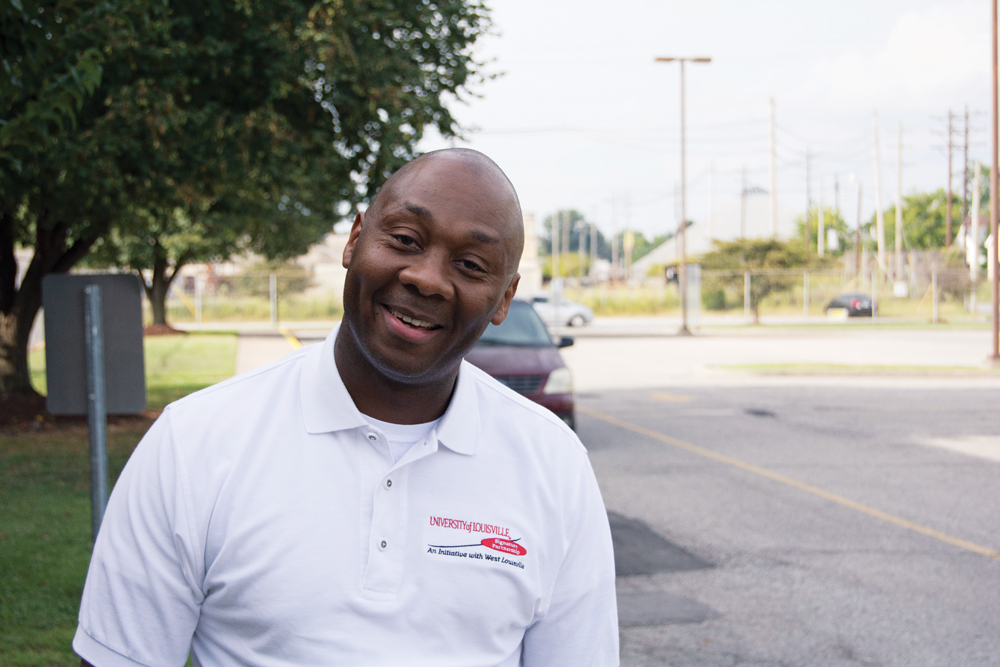
DeVone, Parkland
“I don’t believe that there are outside forces and outside resources that are going to come and save us. It’s counterproductive for us to continue to put so much energy into pursuing people, resources, agencies, businesses and leaders from outside this community. The solutions to improve west Louisville are ultimately going to come from the people who live in west Louisville. We go into our households and we close the doors and watch television and engage with our own families. We don’t function as neighbors anymore. I sincerely believe that the solutions we seek are going to come from us breaking those silos that we live in and doing more to support one another. When I think about all these murders in our communities and these young boys killing other young boys — these are people, by and large, that don’t have fathers in their lives and don’t have parents that are highly engaged. I think that solutions to helping them improve their lives are going to come from people who complain when they sit down on their couches and watch the news and say that somebody must do something. Well, they are the somebodies that must do something.”
_____________________________________

Raesean, Parkland
“I’ve been here for 32 years. My granny bought the house we’re living in right now. She bought it for $20,000 at the time and put in $60,000 in updates. She passed away, but it’s not fair for my granny’s property to look this good and you’ve got this abandoned house right next door to it. You gotta pay the damn exterminator all this money to keep the mice from getting in. Or someone could be sleeping in there and burn it up and then your house is burned up. I’m fortunate enough to not have that next door to me; I couldn’t imagine it. It bothers me when I’m riding past these abandoned houses and people just drop trash out of their windows. They don’t do that out there by the mall or in Indiana. They do that in the west. It’s sickening and it makes me mad. My daughter’s five. I don’t want her riding around and seeing this. The new development is good. We need something nice.”
_____________________________________
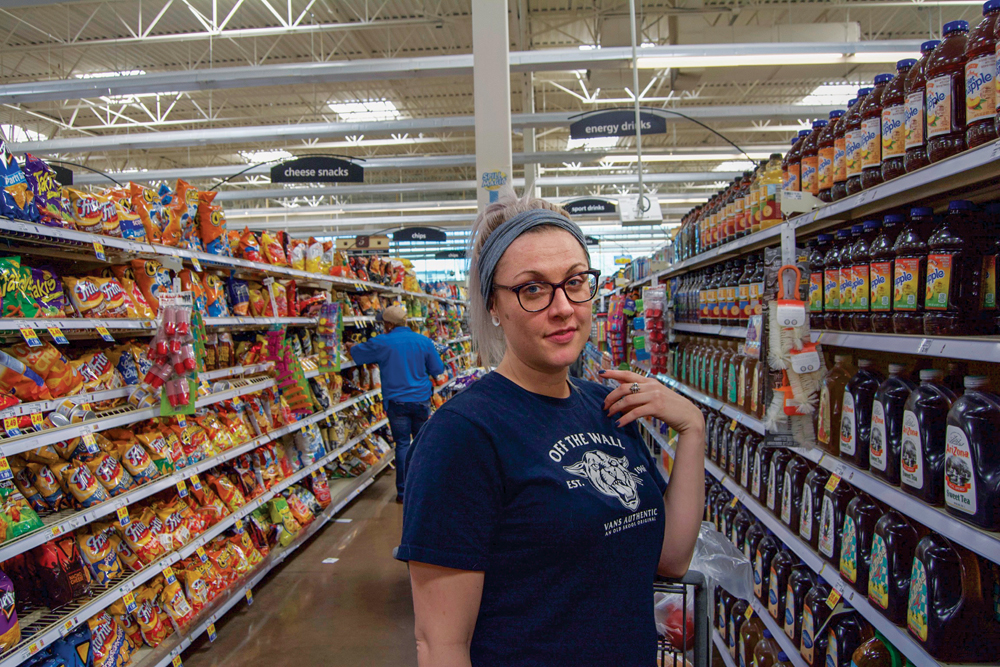
Katie, Portland
“I’ve noticed that a lot of people are buying up the houses down here, refurbishing them and renting them out. You’re seeing privately owned restaurants and coffee shops popping up, and I think it’s like what happened in Germantown 10 years ago.”
_____________________________________

Sharome, Chickasaw
“I’ve been in the West End for about five years now. From where I come from, I always heard that the west was a bad place to go and that one should avoid. Since I’ve been down here, I haven’t had a problem with anybody. I do see that, with the community itself, everybody is divided and nobody really wants to come together and work as one. I would like to see more black-owned businesses and unity in the West End.”
_____________________________________
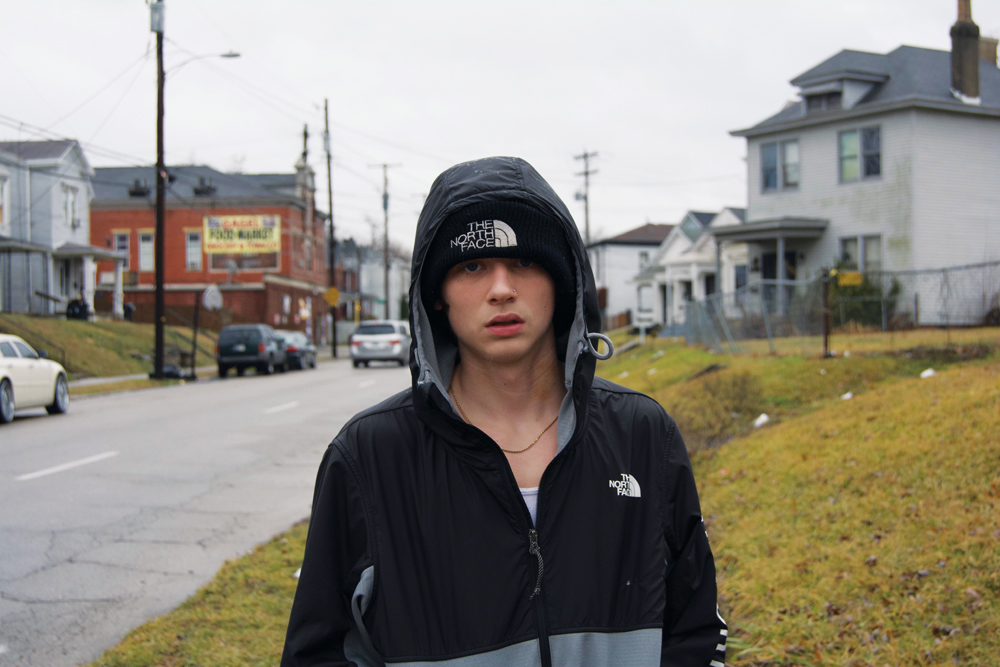
Mark, Portland
“I like how everybody is coming down here and fixing up these abandoned houses and trying to sell them, because we have a lot of ‘bandos’ (abandoned buildings) down here, and it’s where the junkies be at. People ride down the street and see these nice houses and it makes them want to treat Portland like a nice neighborhood. Other than that, Portland’s going the wrong way because all the drugs are coming down here. Portland’s good until you get to that age where everybody wants you to be in the streets. You’re gone and you gotta find your way back out.”
_____________________________________
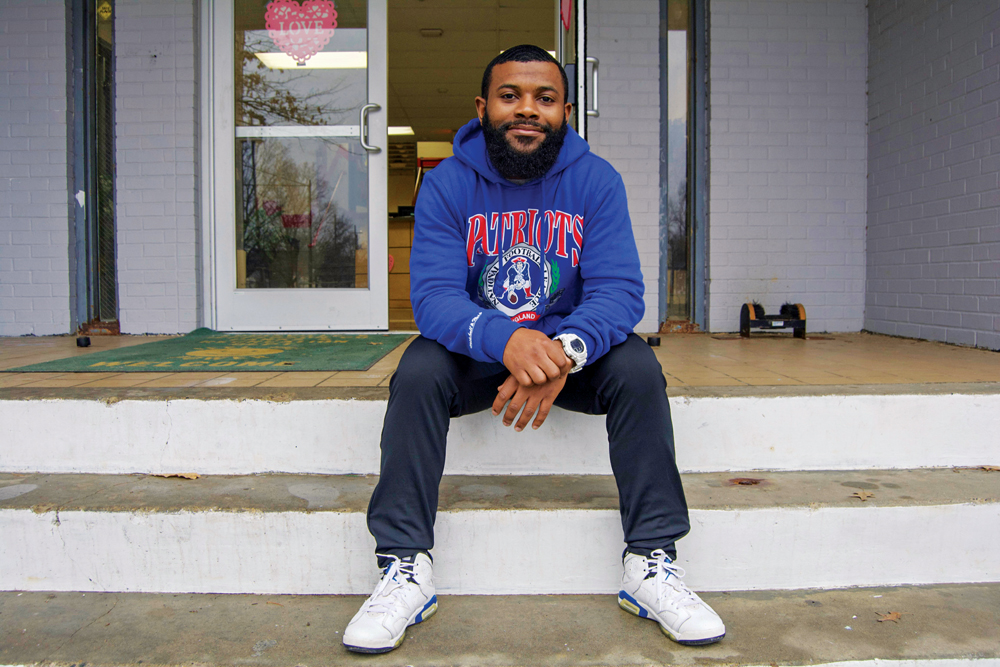
Karlan, California
“Currently, I live in Shively, but I work in the West End. I am from the West End. I think that with all the changes happening, it’ll be more positive than negative. I don’t really think it’s going to hurt us too much. The Y will be another gym and another opportunity for people to work. I do think about gentrification, especially with how they did the NuLu district, Clarksdale, Phoenix Hill. They’re all gentrified.
“I don’t think the West End will be gentrified all the way. We’ll end up fighting it at some point. They’re going for the Russell neighborhood because it’s close to downtown, and they’re going for Portland — which is the white part of the West End, anyways. They’ll get to California because that’s also close to downtown and right across from Russell, plus 18th and Broadway is a busy spot, so it makes sense. I feel like we got enough people that will fight it to keep it black.”
_____________________________________
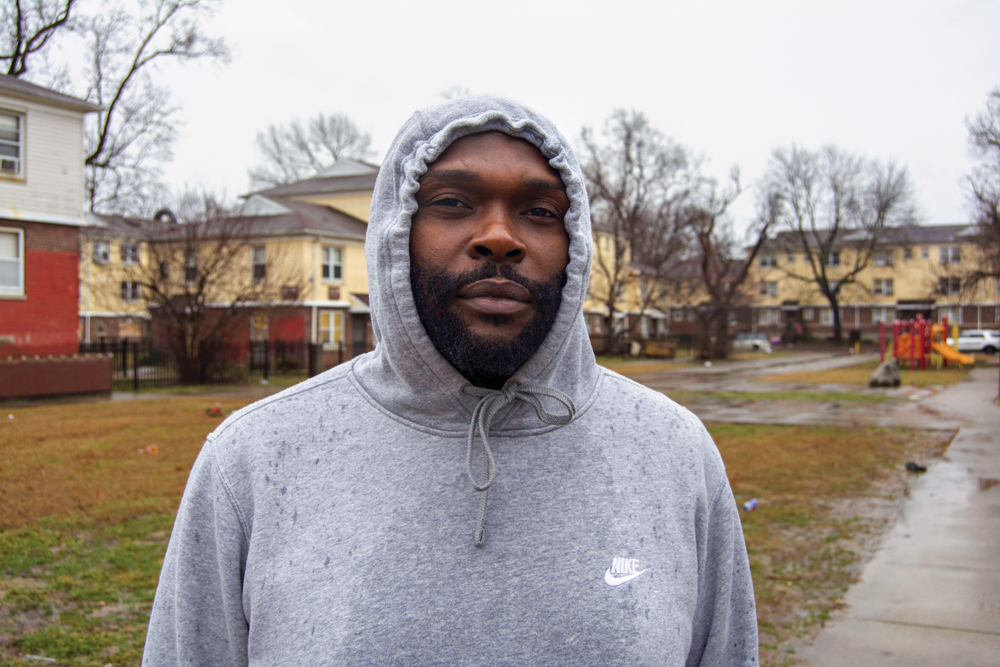
Orlando, Russell
(Beecher Terrace)
“I have no fears about what’s to come. I face my problems and the day-to-day. Just outside my door, two days ago, somebody else got popped. But if you stay out the way, you don’t have to worry about violence. I don’t carry a gun, and I’m in and out the projects. This is where I live. You can’t keep me captured in my home. I’m gonna come out and I’m going to live. I’m going to make sure that I don’t catch any flying bullets, and I’m going to keep my day going. It’s not going to hold me back.
“I’m good with the change. I think it’s all positive, man. I’m with the wave.”
_____________________________________

Dawn, Portland
“I currently live in New Albany, but I was born in 1968 and lived in Portland. It’s still my home and always will be. I lived on Rudd Avenue, and I remember the fruit and vegetable guy who would come by and say, ‘Strawberries! Strawberry Man!’ He was very popular. I remember the milk guy who would come and pick up our milk bottles and replace (them). All the mom-and-pop stores were very popular. I remember being able to ride my bike, by myself, on the sidewalk and not think twice about it. Wouldn’t that be great for our kids and grandkids? Some of the mom-and-pop stores are opening back up again. You see the little cafes here and there. Some of these places are helping others to work again and eat free. You know, they’re teaching people a little about self-worth, and I think that’s important. I think the neighborhood is headed in the right direction, as long as people stay involved and get involved.”
_____________________________________
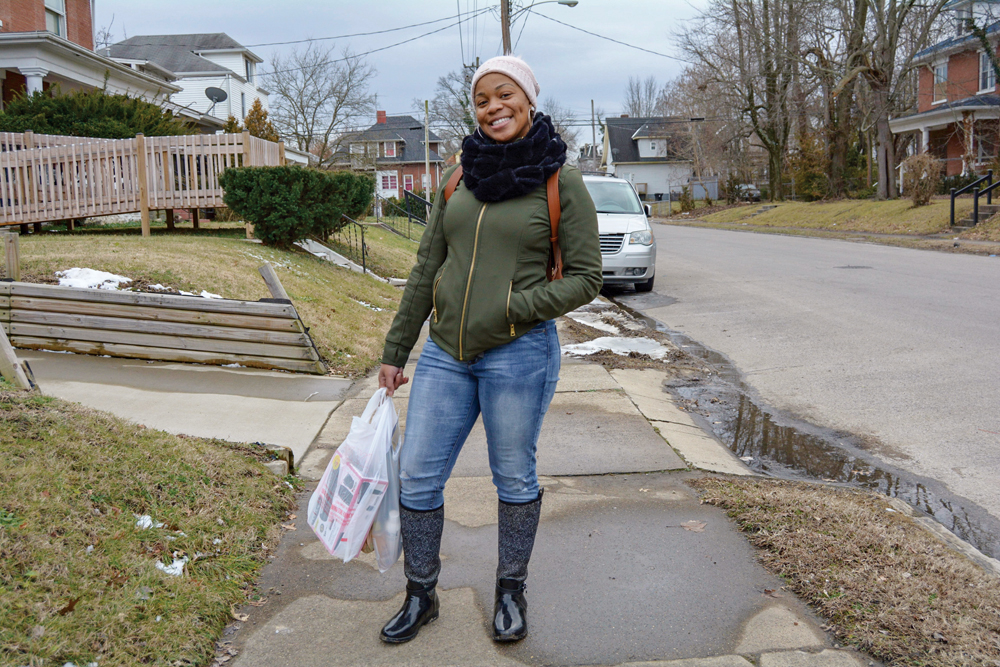
Vineece, Shawnee
“I have been in the West End all my life. Well, I have been here since the third grade, and I’m 26 now. I have lived in other parts of the city, but the West End is home for me. Just like St. Matthews or Prospect is home to someone else, the West End is home to me — to us.”
This originally appeared in the March 2019 issue of Louisville Magazine under the headline "Neighborhood Voices." To read more from our 2019 West End Issue, click here.
To subscribe to Louisville Magazine, click here. To find us on newsstands, click here.



